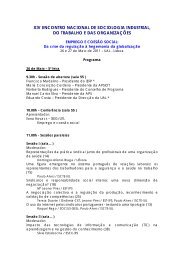Web-based Learning Solutions for Communities of Practice
Web-based Learning Solutions for Communities of Practice
Web-based Learning Solutions for Communities of Practice
You also want an ePaper? Increase the reach of your titles
YUMPU automatically turns print PDFs into web optimized ePapers that Google loves.
CONCLUSION<br />
Our practical goal is to convince our faculty <strong>of</strong><br />
the value <strong>of</strong> e-learning by providing them with<br />
hands on experiences in effective online education.<br />
In this paper, a mentoring module <strong>of</strong> LMS and a<br />
leaning design repository (utilizing the proposed<br />
evaluation scale) was developed as to achieve<br />
our goal. The developed systems and tools are<br />
important components <strong>of</strong> knowledge circulated<br />
management system, which will be the core system<br />
<strong>for</strong> organizational collaboration in our university.<br />
<strong>Learning</strong> activity integration system has a learner<br />
classification function in a mentoring module and a<br />
case-<strong>based</strong> reasoning function in a learning design<br />
repository. The created data set, stored in DBs,<br />
will be used to make instructional knowledge and<br />
assessment knowledge in the near future. It will<br />
allow instructors to reuse the new knowledge <strong>for</strong><br />
daily e-learning. Even though we are currently<br />
using these systems and tools separately, their effects<br />
on educational practice are high as indicated<br />
by the results shown in this paper.<br />
ACKNOWLEDGMENT<br />
This research was partially supported by the Ministry<br />
<strong>of</strong> Education, Science and Culture, Grantin-Aid<br />
<strong>for</strong> Scientific Research (A), 20240069,<br />
2008-2011 <strong>for</strong> technical parts, and Grant-in-Aid<br />
<strong>for</strong> Scientific Research (B), 18300298, 2006-2008<br />
<strong>for</strong> pedagogical parts.<br />
REFERENCES<br />
Allen, I. E., & Seaman, J. (2004). Entering the<br />
mainstream: The quality and extent <strong>of</strong> online<br />
education in the United States, 2003 and 2004.<br />
Newburyport, MA: The Sloan Consortium.<br />
154<br />
An Organizational Knowledge Circulation Management System For Universities<br />
Allen, I. E., & Seaman, J. (2006). Online nation:<br />
Five years <strong>of</strong> growth in online learning. Newburyport,<br />
MA: The Sloan Consortium.<br />
Anma, F., Ninomiya, T., & Okamoto, T. (2007). A<br />
development <strong>of</strong> learning management system <strong>for</strong><br />
interactive e-learning in higher education. In Proceedings<br />
<strong>of</strong> the World Conference on E-<strong>Learning</strong><br />
in Corporate, Government, Healthcare & Higher<br />
Education, Quebec, Canada (pp. 1956-1963).<br />
Bateson, G. (1942). Social planning and the concept<br />
<strong>of</strong> deutero-learning: Conference on science,<br />
philosophy and religion, second symposium. New<br />
York: Harper.<br />
Bateson, G. (2000). Step to an ecology <strong>of</strong> mind.<br />
Chicago, IL: The University <strong>of</strong> Chicago Press.<br />
Bateson, G. (1956). Toward a theory <strong>of</strong> schizophrenia.<br />
Behavioral Science, 1, 251–264.<br />
LAMS (<strong>Learning</strong> Activity Management System)<br />
International. (n.d.).<br />
Lewin, K. (1935). A dynamic theory <strong>of</strong> personality.<br />
New York: McGraw-Hill.<br />
Lewin, K. (1943). Forces behind food habits<br />
and methods <strong>of</strong> change. Bulletin <strong>of</strong> the National<br />
Research Council, 108, 35–65.<br />
Ninomiya, T., Taira, H., & Okamoto, T. (2007).<br />
A personalised learning environment architecture<br />
<strong>for</strong> e-learning. In Proceedings <strong>of</strong> the 6 th IASTED<br />
International Conference on <strong>Web</strong>-<strong>based</strong> Education,<br />
Chamonix, France (pp. 517-521).<br />
Okamoto, T., Nagata, N., Anma, F., & Ninomiya, T.<br />
(2008). The knowledge circulated-organisational<br />
management <strong>for</strong> e-learning practice. In Proceedings<br />
<strong>of</strong> the IADIAS Multi Conference on Computer<br />
Science and In<strong>for</strong>mation Systems, Amsterdam,<br />
The Netherlands (pp. 121-128).



